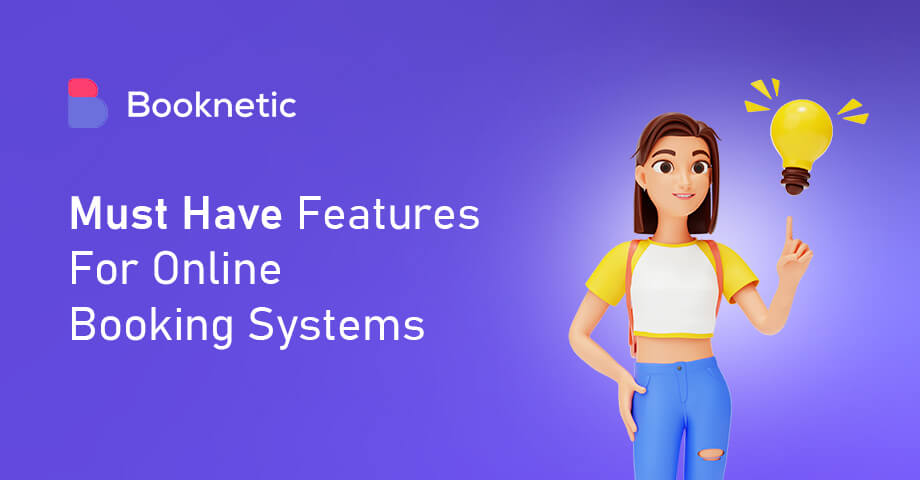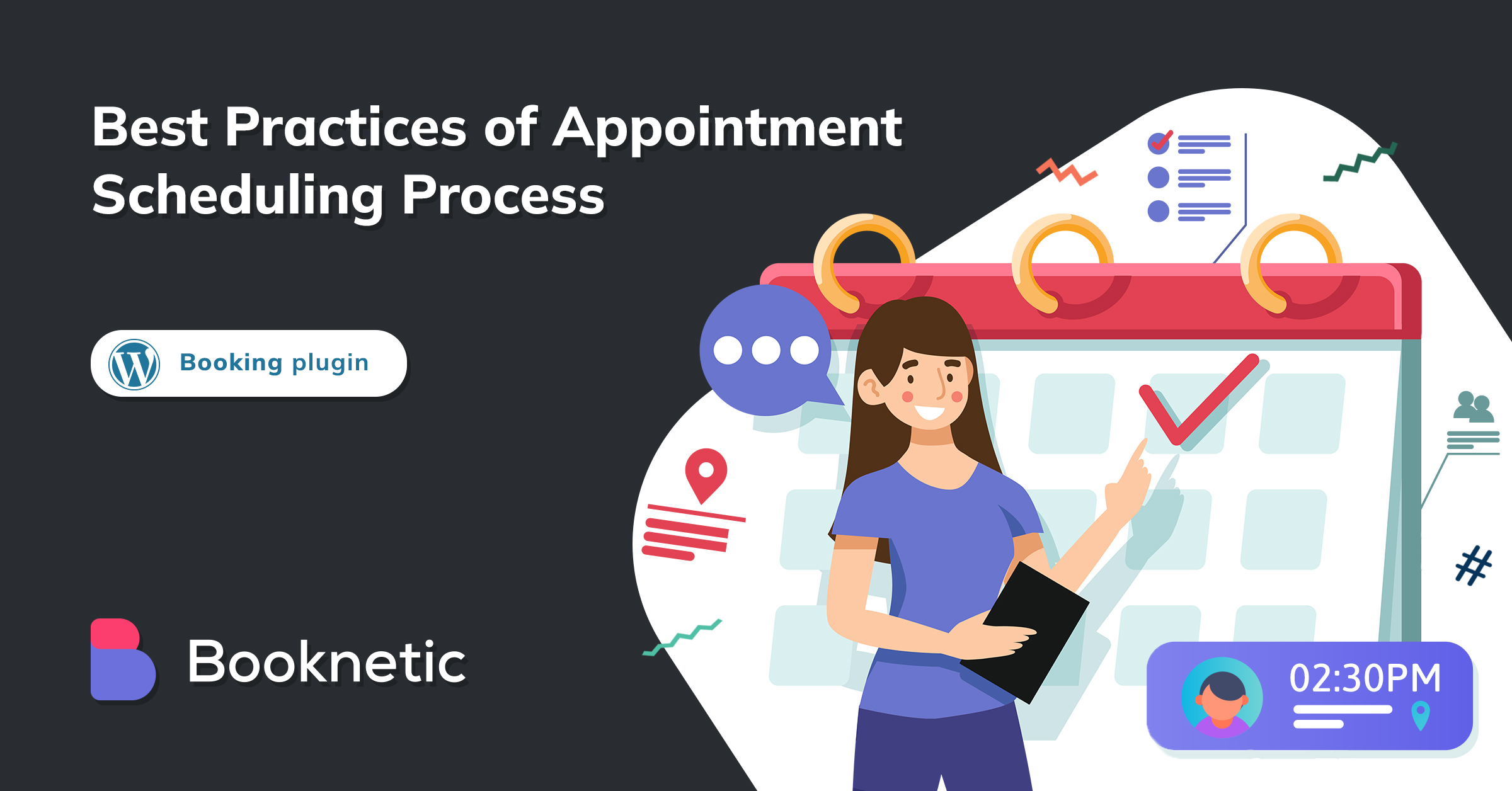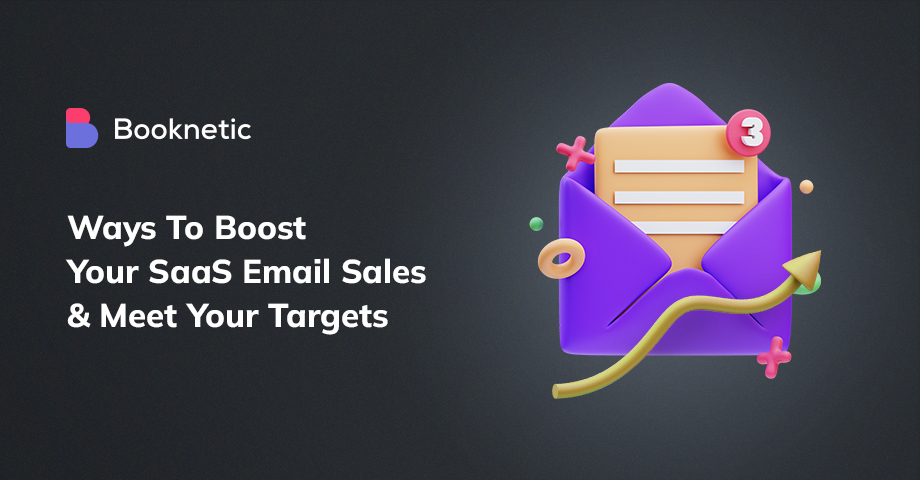Online booking systems are essential for businesses in today's digital age. Consider this: how often do you prefer to book a service online rather than calling or visiting in person? An effective online booking system not only streamlines operations but also improves user experience.
In this blog, we will discuss nine essential features that make an online booking system stand out and why they are essential for businesses seeking success.
Why are online booking systems crucial for modern businesses? Online booking systems save businesses time, reduce errors, and give customers a convenient way to schedule services. This allows businesses to focus on providing a better user experience instead of losing time trying to guess what the customer wants.
What challenges can businesses face without essential booking features? Without the right features, businesses risk losing customers due to a cumbersome booking experience. Essential functionalities make processes more efficient, reduce booking conflicts, and provide valuable insights to improve services.
How can the right features improve user experience and efficiency? The right features make booking easy and smooth by eliminating common problems like payment issues and calendar conflicts. This way, consumers get guaranteed to have a good experience from start to finish.
User-Friendly Interface Let's face it. No one enjoys a complicated booking process. If they had a choice, 9 out of 10 people would choose a simpler interface over a detailed booking experience.
When users find it easy to navigate and make bookings, they're more likely to return and recommend the service to others.
What elements make a booking interface user-friendly? A user-friendly interface should have a clear layout, intuitive design, and easy-to-understand instructions.
Features like mobile responsiveness, accessible features, and cross-platform compatibility are crucial.
Additionally, the system should offer customization options tailored to individual business needs.
How can a user-friendly interface reduce booking errors? A straightforward and intuitive design minimizes user confusion. With clear prompts and minimal steps, users can complete bookings without misunderstandings or mistakes. Incorporating features like real-time booking and booking history tracking can further ensure accuracy.
What are some design best practices for online booking systems? A few best practices include:
Mobile responsiveness: Ensure the platform works seamlessly on various devices.
Clear CTA buttons: Use buttons that stand out and are easily recognizable.
Simple layout: Avoid clutter and use white space effectively.
Feedback and reviews integration: Let users share their experiences and read others'.
Review and rating system: Provide a system where users can rate and review services.
Availability Calendar This calendar type allows customers to view available slots and make informed decisions. More importantly, it saves businesses from the hassle of double bookings or overbookings.
How does a real-time availability calendar benefit both businesses and customers? For businesses, a real-time calendar eliminates booking overlaps, ensuring efficient resource allocation. For customers, it offers transparency. They can choose slots that fit their schedule, leading to increased satisfaction.
What challenges can arise from not having an accurate availability calendar? Without an accurate calendar, businesses risk double bookings or missed appointments. It can also lead to decreased customer trust if they're often informed of booking conflicts post-reservation.
Are there any advanced features that enhance calendar functionality? Absolutely. Features like syncing with other calendars, block-out dates, and resource availability tracking can elevate the booking experience. Integration with third-party apps and mobile app integration ensures businesses and customers are always in sync.
Payment Processing In the age of digital commerce, a smooth and secure payment process is non-negotiable. When customers decide to book a service, the last thing they want is a hiccup during payment. It’s essential that online booking systems offer multiple, secure payment gateway options to cater to varied user preferences.
Why is secure payment processing a critical feature for online booking systems? A secure payment process isn't just about transactions; it's about trust. When customers know their financial information is safe, they're more likely to make a booking. Plus, data breaches can lead to significant financial and reputational damages for businesses.
What are the common payment gateway options available? Popular payment gateways include PayPal, Stripe, and Square. Many online booking systems also offer integration with regional payment providers. Features like guest checkout, two-factor authentication, and payment confirmation enhance the transaction process.
How can businesses ensure data security during payment transactions? Adopting security protocols like SSL certificates, GDPR compliance, and two-factor authentication are essential. Using a password manager to store and manage secure access credentials can further prevent unauthorized access. Regular security audits, HIPAA compliance (for healthcare industries), and partnering with trusted payment gateways also enhance security.
Integration Capabilities Integration is the name of the game. A robust online booking system doesn't operate in isolation. It needs to seamlessly integrate with other tools and platforms that businesses use, from all in one CRM systems to email marketing tools, ensuring a cohesive and efficient workflow.
How can integration capabilities improve the overall business workflow? Integration streamlines operations. For instance, syncing with POS systems or inventory management can automate processes, reduce manual entries, and minimize errors. Email marketing integration enables targeted campaigns based on booking data.
What are some essential integrations that businesses often require? Common integrations include:
CRM systems: For managing customer data and interactions.
Email marketing platforms: For campaigns and automated reminders.
POS systems: To sync bookings with sales data.
Third-party apps: Tools like Google Calendar or Zoom for virtual meetings.
Social media integration: For easy sharing and promotions.
Are there any potential challenges when integrating booking systems? Integration challenges can range from compatibility issues to data discrepancies. It's crucial to choose systems with proven integration track records, and, if needed, have backup systems in place. Load balancing can also ensure smooth performance during high-traffic periods.
Customer Profiles Personalization is key in today's service landscape. Customer profiles allow businesses to understand their clientele better, offer tailored services, and build long-term relationships. These profiles store valuable data, from booking history to preferences, helping businesses enhance their offerings.
How can customer profiles help businesses build long-term relationships with clients? Knowing your customer is the first step to satisfaction. With detailed profiles, businesses can offer personalized deals, remember preferences, or even wish clients on their birthdays. Such gestures, backed by data, foster loyalty and repeat business.
What kind of information should be included in customer profiles? Information varies based on business type. Typically, profiles include contact details, booking history, preferences, and feedback. Features like loyalty program integration, appointment categorization, and service customization can enrich profiles.
What measures should businesses take to protect customer data privacy? Data privacy is paramount. Adopting GDPR compliance, ensuring two-factor authentication, and regular data backups are crucial.
Businesses should also be transparent about data usage, allowing customers to opt-out when necessary.
Notification System Staying connected has never been more critical, especially in a world where everyone is on the go. A robust notification system acts as the bridge between businesses and customers, ensuring timely reminders, confirmations, and updates.
It's not just about preventing no-shows—it's about enhancing the entire booking experience.
How do automated notifications benefit both businesses and customers? Automated notifications keep both parties informed.
For businesses, they reduce no-shows and last-minute cancellations, optimizing resource allocation.
For customers, reminders mean they won’t forget their appointments, and confirmations provide peace of mind.
What are the best practices for scheduling and sending notifications?
Timely reminders: Send them not too early, not too late—ideally 24 to 48 hours before the appointment.
Clear and concise content: Keep messages direct, mentioning the appointment's date, time, and any necessary details.
Multiple channels: Utilize email, SMS, and even app notifications, catering to customer preferences.
Customization options: Allow clients to choose the frequency and type of notifications they want.
Security Protocols In an era where data breaches make headlines, a booking system without top-notch security protocols is like a fortress without walls. Customers trust businesses with their personal and financial data. Thus, ensuring this data's safety is a responsibility, not a choice.
Why should businesses prioritize security in their online booking systems? Security is a trust factor. Breaches can lead to lost customers, legal issues, and damaged reputations. Prioritizing security ensures customer trust, safeguards sensitive data, and meets regulatory requirements.
What are some common security threats to online booking systems? Phishing attacks, malware, unauthorized data access, and DDoS attacks are prevalent threats. Implementing features like two-factor authentication, SSL certificates, and regular security audits can mitigate these risks.
How can businesses maintain GDPR or HIPAA compliance in their systems? By adopting strict data handling and privacy measures. This includes transparent data collection policies, ensuring data encryption, and allowing users to manage their data (like deleting their profiles). For industries handling health data, HIPAA compliance further involves stringent data protection measures and regular audits.
Reporting and Analytics In the age of data, understanding your business metrics is the compass to success. Reporting and analytics tools embedded in online booking systems offer invaluable insights, from customer behavior patterns to peak booking times, helping businesses make informed decisions.
How can reporting and analytics tools help businesses refine their booking strategies? Data-driven insights spotlight what's working and what's not. Analyzing booking trends, cancellations, and peak times can guide promotional strategies. Businesses can also identify growth opportunities and areas needing improvement.
What key performance indicators (KPIs) should businesses monitor? Essential KPIs include:
Booking conversion rate: The number of completed bookings versus total visitors.
Customer retention rate: How often clients rebook.
Peak booking times: Identifying busy slots to optimize resource allocation.
Cancellation rates: Understanding why clients cancel can inform improvements.
Are there any emerging trends in booking system analytics?
Yes! Predictive analytics is gaining traction, helping businesses forecast future booking trends. Integration with broader business intelligence tools is becoming common, allowing in-depth analysis and holistic business insights.
Scalability Options Scaling isn't just about growth—it's about adaptability. As businesses evolve, so should their online booking systems. Whether it's integrating new features, accommodating more bookings, or branching into different services, scalability ensures your system can handle the change without breaking a sweat.
Why is scalability crucial for businesses of all sizes? Scalability ensures long-term viability. For startups, it means the system can grow with the business. For established entities, it allows the adoption of new features or expanding user bases without complete overhauls.
What factors should businesses consider when evaluating scalability options?
Volume capacity: Can the system handle a sudden surge in bookings?
Feature integrations: Does it support third-party plugin support or mobile app integration?
Customization: Can businesses tweak the system to suit their unique needs, be it service customization or adding languages?
Infrastructure adaptability: How well does it sync with emerging technologies or platforms?
Conclusion Online booking systems are key players in many successful businesses. They simplify, streamline, and supercharge the reservation process.
But it's not just about having a system; it's about having the right features—ones that prioritize user experience, ensure security, and provide actionable insights.
While all features are integral, the user-friendly interface stands out. If users find the system cumbersome, even the best functionalities won't save it. First impressions matter!




